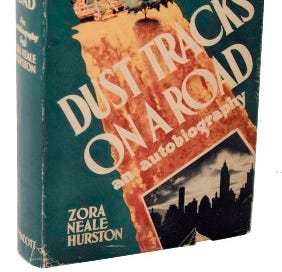Dust Tracks on a Road by Zora Neale Hurston | Reflection + Book Review
a review of Zora Neale Hurston’s 1942 autobiography
Dust Tracks on a Road by Zora Neale Hurston is an autobiography that tells the story of her life, from her childhood in Eatonville, Florida, to her years as a writer in New York City, through her anthropological work in the Deep South and Caribbean. Hurston's writing is lyrical and evocative. She vividly portrays the Black community in the early 20th century. She also discusses her experiences with racism and sexism, and her struggles to find her place in the world. I found reading her life’s story very entertaining and eye-opening. Zora found herself in a lot of tough predicaments, but her optimism would shine through and see her triumph every single time.
Overall, Dust Tracks on a Road is a classic work of African-American literature, and it is essential reading for anyone interested in Hurston's life and work. The book is also a valuable historical document, providing a unique perspective on the Black experience in America.
I was particularly interested in the series of visions she had as a child that ended up foretelling her future. I’ve always had an interest in metaphysical matters. So I love it when that shows up in literature, especially true stories. There were multiple points of extreme poverty in her life, but she never gave up on education. She had haters who were her peers in the Harlem Renaissance, but she kept writing every genre she could get her hands on. She ended up dying alone, but not before seeing parts of the world most black women of her time could only dream of. Not only was Zora Neale Hurston a Capricorn. She was a G.O.A.T. of 20th-century black writers.
One of the most striking things about Dust Tracks on a Road is Hurston's use of language. She writes in a rich, everyday style that is full of humor and warmth. She also uses her writing to explore the rich cultural traditions of the Black community. Hurston's memoir is also a powerful indictment of racism and sexism. She writes candidly about her experiences with discrimination, and she exposes the hypocrisy of the white world and even within black schools of thought as well. The end of the book feels like a stream of consciousness from her; where she unweaves the idiocy of racial superiority within any context.
We can learn a lot from this particular quotation from Hurston, “My sense of humor will always stand in the way of my seeing myself, my family, my race, or my nation as the whole intent of the universe.” Her writing is a reminder of Black people's struggles, and it is a testament to her resilience and strength. Zora shows how ahead of the sociopolitical curve she was for her era. She had a keen critique of racial supremacy as a concept. She is solidified in American canon and scholarship. May America be grateful for her political, literary, and anthropological work.




